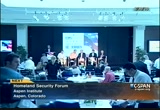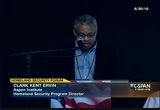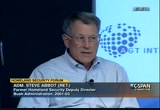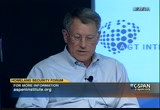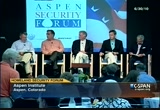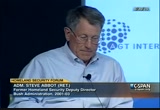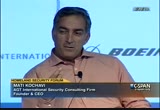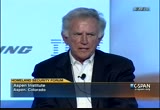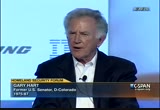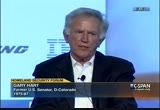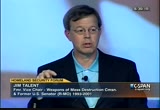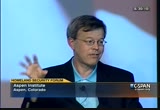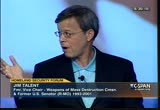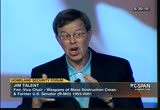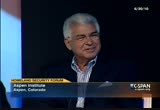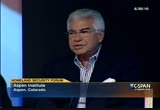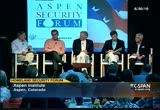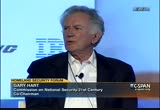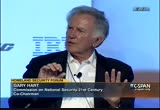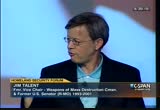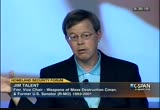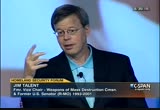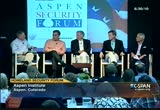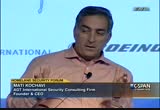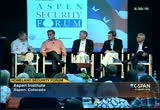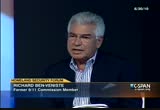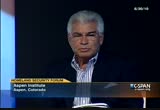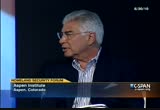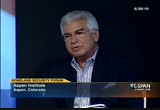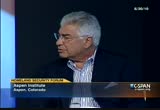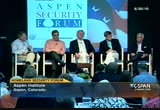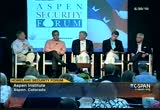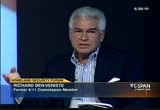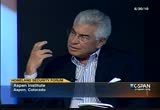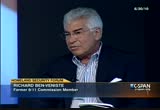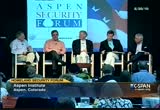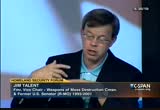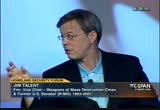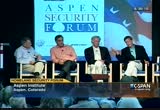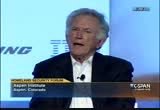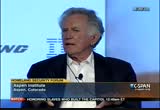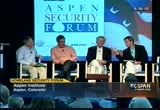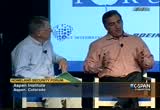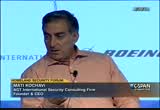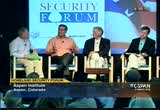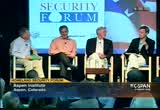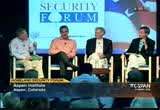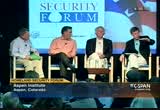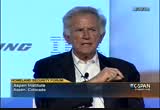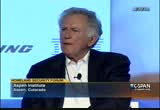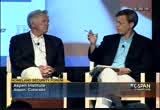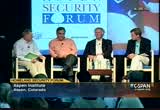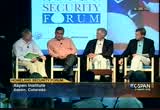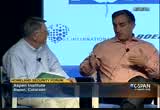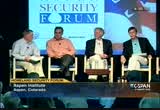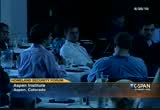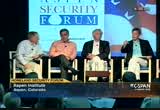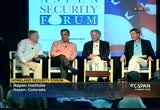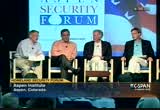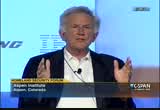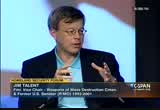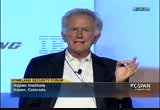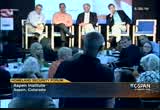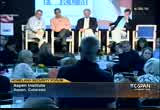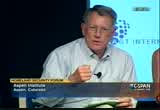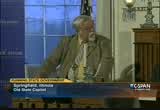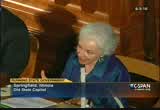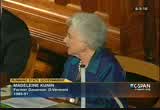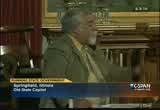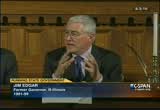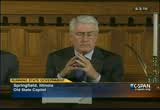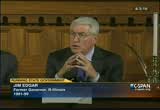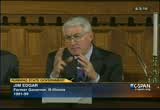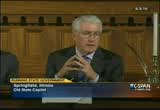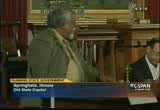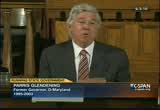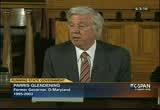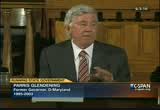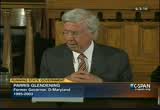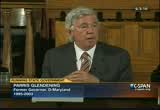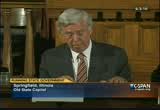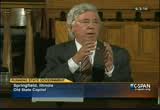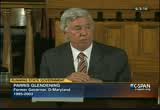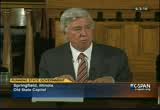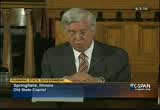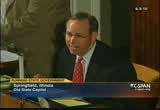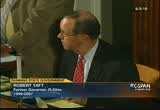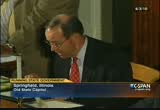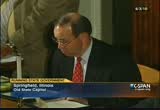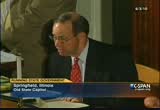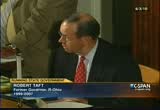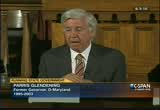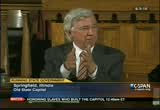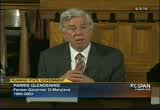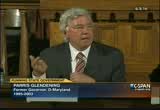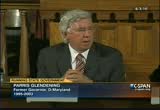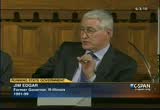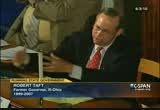tv Tonight From Washington CSPAN July 5, 2010 8:00pm-11:00pm EDT
8:01 pm
in a "captive" the author and his guides were taken hostage. hear his story on the book tv. c-span is now available in over 100 million homes, bringing you a direct link to public affairs, politics, history, and education, created by america's cable companies. up next, homeland security and how prepared we are if there is another terrorist attack. this is one hour and a half. >> welcome to the next session. as you can see, the title is
8:02 pm
"how prepared are we for the next 9/11? " we have a member of the 911 commission that p investigated the attack, and a member of the private sector. to moderate the session, we have an admiral who is the president and chief executive officer of the navy relief society, a non- profit society dedicated to helping navy service members and their families. he served as deputy homeland security adviser under thomas ridge. admiral.
8:03 pm
>> good afternoon. i am very grateful for this opportunity to be able to lead discussion with this panel on terrorism prepared as. -- preparedness. i am going to start by posing a question to our panelists after a provide you some counterpoints on what is generally known as pbrne threats: chemical biological, radiological, nuclear and explosive. we are going to use that to hopefully cover the territory with respect to terrorism preparedness. the chemical threat. some say that it is likely --
8:04 pm
actually, unlikely, that an attack with a chemical weapon could cause mass casualties, citing an attack in japan in 1995 as an expensive underraking with few fatalities. while others say that delivery of a persistent agent in an enclosed, densely populated space may kill hundreds if not thousands, and would certainly cause mass panic and destruction. biological. a senior official from the department of homeland security said recently that a biological attack is one of the two top priorities for the department of homeland security. others say that obtaining and delivering a biological agent, one which results in many fatalities, is actually expensive, scientifically
8:05 pm
challenging, and likely to be beyond the near-term capability of any sub-state terrorist organization. radiological. it is said that a dirty bomb is unlikely to cause many fatalities or major physical damage. others say that the long-term contamination from such an attack could make a major metropolitan area virtually uninhabitable for perhaps decades, and the cleanup would be long and exceptionally expensive. nuclear. that same official from dhs said that an improvised nuclear device is the other of their top two priorities. but some say that terrorists, for a variety of reasons, are unlikely to be able to obtain
8:06 pm
transport and that indeed such a device successfully inside the united states. finally, high explosives. many say that we should continue to plan for this most likely attack. it is low-tech, relatively inexpensive, and almost always effective, the christmas day in times square incident not withstanding. others say that terrorists, especially al-qaeda, are looking for something more sophisticated than an attack that will produce -- and an attack that will produce results even more dramatic than 9/11. with that as a background, i am going to start us down the path of getting to look at those. before we actually talk about the specific steps -- specific threats, and want to ask this
8:07 pm
question of each of the panelists. if you are able to listen to michael this morning, especially his remarks about taking down the al-qaeda leadership and the apparent lack of progress of the terrorist groups in obtaining biological and nuclear capabilities, you might be convinced that the chance of a major attack on the united states, especially a weapon of mass destruction attack is diminished. so my question is, how convinced are you that there will be another major terrorist attack in the u.s.? another 9/11? >> i think we need to look at in a very broad perspective. there is a clear network of
8:08 pm
communication between terrorist organizations. even if you assume that one person is weak, you have to look at the other organizations connected to him. organizations such as hezbollah might say that politically they cannot confront you directly, but they could do it through other means, such as al-qaeda. you should not just look at the capacity of an organization itself, but the capacity of its network. this is something critical to understand. we cannot look at terror in a just north america. the second thing that is very important, we have to look at the component of terror.
8:09 pm
you might look at a very small organization that has access to technologicala capability from a country that supports terror. this is something that we should expect and prepare for. >> let me begin, if i may, by welcoming everyone here, particularly those of you who have not visited the community before. i hope that you will take the time to travel around aspin and see how the average person in colorado live. [laughter] you might even go to the airport to see how they commute to their various houses. [laughter]
8:10 pm
this is an extraordinary convention and conference center and we are very proud of it. there certainly will be other major efforts to disrupt the united states economy and to enter and kill as many americans as possible. -- injure and kill as many americans as possible. if you reason backward from the mind of a terrorist, you look for what is the easiest thing to do that could cause the most damage. in my mind, that is a biological threat. i used to say in media interviews that the next attack would not be on new york or los angeles. it would be on denver, cleveland or dallas. i had to quit saying that, because cleveland was asking me what i know that they do not
8:11 pm
know. the point is, even though new yorkers believe, and are best prepared for another attack, because they have had this experience, if you want to terrorize americans, you do not keep hitting in new york city. you come to the vulnerable center of this country and multiple targets. and, the terrorists themselves become the weapon of mass destruction by voluntarily infecting themselves with highly contagious viruses, going to public events, certainlyynot a conference such as this, and exposing the virus to as many people as possible. that is the variety that concerns me the most. >> i agree with everything he
8:12 pm
said. i will give a little history of the 9/11 commission. we were a follow-on to that commission. in the summer of 2007, this commission was created to answer the question that the 9/11 commission asked, what happens if the most dangerous people in the world get the most dangerous weapons in the world? how likely is that, and what can we do to prevent it? background is more straight pentagon stuff. ob is in intel. i knew what people like respected thought about it and it.afraid they were of deposi
8:13 pm
this was the nightmare they were worried about. we said in interviews. hundreds of people went all around the world, look at all the data, and reached the conclusion that the possibility of a nuclear or biological attack was growing and would reach the probability within five years, which is 2013. now, we did not have intel saying 2013, but we were making the point that this is a short- term thing. this is not 15 years from now. there is a substantial chance now, and it is growing. aid that you have to work on the assumption that this is likely to happen unless you change the probabilities or the trends. conditions in the world favored them. there are four reasons, and i will go through them very
8:14 pm
briefly. first, we have direct intelligence that they are trying to do this. many thingsshave become public about biological labs in afghanistan, trying to buy nuclear materials. we know that they are trying to do this. it fits their tactics. the tactic is to pit vulnerable areas, and vulnerable assist -- hit more vulnerable areas and vulnerable systems as hard as you can with asymmetric weapons. the airplanes used on 9/11 were asymmetric weapons. the ultimate asymmetric weapon is a weapon of mass of destruction, nuclear, biological, any of these. we know that they are trying. we know it fit their tactics. we know that organizationally they are capable of doing this. it is not scientifically beyond them at all. if you recruit the right scientists, you can develop a
8:15 pm
anthrax exists in nature. you can get smallpox around the world. it is easy to suckle. -- to smuggle. you get a pound of that, a pickup truck, but a shell on it, but a hole in it, drive up and down in st. louis on the fourth of july but the waterfront -- by the waterfront, then blow it up. people do not know they have been attacked, but in a few days they have symptoms. this could kill hundreds of thousand of people. they cannot do it yet, but we know they're trying to. we thought biological was a little more likely than nuclear because there are bottlenecks to nuclear. you have to get the nuclear
8:16 pm
material, and you have to have a national economy in getting nuclear material. that is harderr it is a little harder to recognize. we thought biological more likely. i will say this. it is not that our government is not trying to stop this. many people say we are screwing up. perhaps we are screwing up, but this is hard. that is why they are trying to do it, because they know it is hard to defend against. they are pursuing this because they know that it is hard to defend against in a first world society with a federal government structure. a man who used to be chairman of
8:17 pm
the intelligence committee the goes on trips all the time we interviewed all of the people. he came back and told me that if anything, our estimate was too conservative. these are serious people saying this. >> it is not a laugh riot now in here, is it? just to add to the menu of horrible possibilities, i would take a slightly different approach, something that i have a word about time to time over the years since -11. that is a al-qaeda's and tenuity -- since 9/11. that is al-qaeda's on ingenuity
8:18 pm
for using what is here. on 9/11, they used commercial airlines filled with fuel, which became flying bombs. i have been concerned about the possibility of attacks against, for example, the transportation of hazardous materials and by rail, chlorine gas, for example, which is transported on a rail line that runs only blocks from the u.s. capitol. think about that. our nuclear plants are another area of potential destruction. i will not get into the technical stuff, but you do not have to get to the core of a nuclear plant to cause
8:19 pm
tremendous, horrendous and destruction. >> so, we clearly have unanimity on a the severity of this issue. i would like to talk a little bit about how we are organized to deal with it. dwight eisenhower said that the right organization will not guarantee success in but the wrong one will guarantee a failure. yesterday, we heard a discussion of the progress that has been made by the department of homeland security over the seven years or so that it has been in existence. then, at lunch, someone else mentioned that if she had to do it over again she might reengineer some of it. senator, i know that you look at this early on, so -- and we actually talked about how it form itself into the basement of the white house. how do you feel it has done so far?
8:20 pm
>> a couple of observations. first of all, i think everyone would agree, probably everyone in the room, that 100% success is probably unachievable. we are talking about relative success. some years back i had secret service protection. the head of the secret service came to our home and sat my wife and me down and the first thing he said was, if somebody decided to kill you, they will probably kill you. the only time i questioned running for president. he said, our job is to make it as difficult as possible. that is the standard, is dhs doing everything within its powers and within the law to make it as difficult as possible. without having access to classified briefings and knowing exactly what is going on on the other side, the answer is,
8:21 pm
relatively, yes. we are more prepared than we were a decade ago, for sure. the second observation is that the department, at least from a standpoint 1,500 miles away, is an administrative nightmare. i agreed with the speaker yesterday who asked if the department should be reorganized? is it not possible to separate out the counter-terrorism tasks of the department from the routine border patrol, customs, and other missions? the answer is yes. is it going to happen? i doubt it. congress would drake its feet. the administration does not want to go -- congress would try its feet. the administration does not want to go backwards. >> do you have a view on how dhs has done and whether it needs to be reengineered to any
8:22 pm
degree? there has been a suggestion that things should be set up independently. >> i would agree that the dhs experiment has been a success. a lot of good work is being done. yes, i think we have done a lot since 9/11. it would be ridiculous to say that we are doing the same thing now that we were doing then. but the problem is, we are not the only ones. i would identify at the structural problems. there are several fold. one of them is, and i would refer this to biological in particular, on the nuclear side of things, the nuclear age began with a nuclear explosion. everybody knew right from the beginning that nuclear had dangerous propensity. our government had a generation
8:23 pm
to develop how to approach the nuclear issue. biological is new. there are like two dozen presidentially appointed people with part-time responsibility for bio, and no one is really responsible. congress has got to change the way it oversees dhs. we were there, and you guys have the congressional oversight process can be tremendously constructive and helpful if done the right way. the house armed services committee really adds, on balance, to policy and development. but when you split up oversight among 70 or 80 different committees and subcommittees, you get the-of oversight
8:24 pm
multiplied. and you get no outcome. congress has construction and remade itself a negative in this. it is time for them to actually fix it. the other problem is that, particularly with bio preparation, there is the federal government, state government, local government and the private sector. there needs to be a partnership that is not adversarial, because things actually have to be done. if the government wants to stop things it can take an adversarial stance, but if it wants things to happen, you have to work together. with developing and stockpiling countermeasures, that ought to be a federal and private sector
8:25 pm
partnership that the federal government leads in. there are issues to work out. i think dhs is part of that, and i would say they should identify who is in charge. i would add one thing. i think the top-level people have to find a way to end run the structure, because you're not going to fix it in time. if an artery is blocked, you pull the plug through capillaries until you get an operation. >> dhs has been constructed in an all-hazard mode. it takes care of everything, from the natural disaster to the border problem to these issues. a question is often asked, if you prepare for the cbrne case,
8:26 pm
have you adequately prepared for everything else. ? the simple answer is no. this is the first time in human history that small organizations have the capacity of destruction that once was only in the hands of large nations. that is what we are talking about here. this is a major shift. the second issue that we year is how difficult it is for dhs to work as an organization. who are they facing? they are facing organizations whose biggest asset is mobilization. their biggest asset is the fact that they can move very fast.
8:27 pm
so, you take a very fast, very creative and a very innovative enemy. we keep saying al-qaeda, but it is misleading to think about only them. fast,ake these very small organizations, and you put in front of them a very complicated organization. where i come from, thaa is not how you win. you have to create some kind of a shift in the way you operate against this kind of organization. you must have a fast organization that is very smart and very intelligent. >> i want to say that we feel that -- that we fear that richard is going to have to
8:28 pm
leave us a little early. i would like to let him make another comment, and then i have a follow-up. >> on congressional oversight, of the 43 recommendations of the the 9/11 commission may, we recognized that the most difficult one to achieve it was a recommendation to streamline congressional activity, particularly pursuant to dhs. it is crazy. thegree with mike depthat situation that confronted us on september 26th was a lot different than 9/11. yet, there were echoes of problems connecting the dots and connecting communications. but i think there has been tremendous progress made. having said that, you cannot take the human element out of
8:29 pm
the equation. with respect to the christmas day attempt, you had human failures. had the state department recognized that abdulmutallab had a valid visa he would at least have been intercepted for secondary screening. someone might have asked him why he was going to detroit without an overcoat and a bunch of other questions that might have clearly identified him as someone who should not be traveling on a plane. let me mention a couple of other things. clearly the christmas day attempt was a wake-up call that we will be under attack for the
8:30 pm
immediate future. the analogy of a virus that will wax and wane is a good one in terms of dealing with a surge of terrorism. we are doing better. a couple of observations. dien night -- dni is in flux. our recommendation there has been one of the most difficult systemic changes to make work. it needs to be rethought by the president. it has not operated as had been hoped. there are a bunch of reasons for it. there are huge reasons. the department of defense and the cia have tried to strangle the baby in the crib. my view, speaking only for myself the primary mission
8:31 pm
should be one of interconnected the among the intelligence community. one major thing that has been talked about over the last couple of days here, and i really have to commend a few people for putting this together, it has been a tremendous learning experience for me and i really appreciate having been asked to participate. one thing has to do with civil liberties and harnessing the tremendous capability we have to collect them permission -- collect information. but we need to assemble the information in some usable form for the best result for america. i was very active in terms of
8:32 pm
recommending, during the commission's years, that we pay close attention to the questions of civil rights and civil liberties. we need to have a dialogue in this country. we need to be able to harness the capability to utilize our technology in the most efficient way possible while at the same time protecting our civil liberties. we can do that. in 2004, the congress created, as part of its reorganization the legislation that creates a privacy and civil liberty oversight. it is not a surprise that in the bush administration this was a pretty feckless and useless group. president obama has not yet addressed the privacy and civil
8:33 pm
liberties oversight board. i suggest that he should do so, and i suggest that this could be the vehicle from which we could have an intelligent discussion within government about using our capabilities to my information, to connect the dots, while at the same time protecting our civil liberties. finally, let me just make one observation in terms of ity width and interoperabl for our first responders. nine years after 9/11, the fcc has still not provided dedicated bandwidth for our first responders. on 9/11, many of them died its debts would likely have been avoided had the fire department and police department in been able to communicate.
8:34 pm
it is high time we got some action on that. it is shameful that we do not have it yet. >> one of the issues that the 9/11 commission wrestled with was whether the current structure of government was appropriate for a counter- terrorism missions, and specifically if they're needed to be surgery or operation changes in the fbi's role. do you have any feeling now, looking back, whether the decision not to do anything with the fbi was the right decision? >> i think it was. the fbi has struggled with its mission on the counter- terrorism. i have a personal high regard for the director. that being said, it is shameful that once again, the senate intelligence committee, in its
8:35 pm
report on the christmas day bombing, identified the fact that they still do not have the capacity for their information technology to communicate with any organization. one of the key analysts was denied access to intelligence that was in another place at the fbi. it is shameful that we have not fixed that problem. what i would look to hear in terms of the growing threat of domestic terrorists is the example, both in london, and in 1994, the train bombing in madrid. four trains during morning rush
8:36 pm
hour were attacked with 13 bombs inside backpacks, causing significant death and injury among the spanish population. those attacks were not connected to al-qaeda. those attacks were by foreign nationals living in spain and had come together in present, and arrested for street crime, shared the radical views, became more radicalized, supported themselves when they got out by selling drugs, and were able to coordinate this attack. the four trains were detonated within the space of three minutes. this is a tremendous problem for
8:37 pm
us. these kind of domestic attacks where the fbi would have primary responsibility, working hand-in- hand with state and local governments. we cannot rely upon the incompetence of our adversaries. we have been lucky in the last two big ones, times square and the christmas day northwest flight, but we cannot rely on that. i talked about the cooperation between the nypd, the cia, the f b i, and the tva. the tva are the pretzel vendors. i do not think this country
8:38 pm
should have the equivalent of a secret police. i think the fbi can do it, but this requires presidential leadership to stay on top of the situation. it requires the fbi to the bill the mission i believe they are ultimately capable of. >> and no mi? >> no mi. -5. >> we greatly appreciate your participation today. safe travels. [applause] i would like to shift to another organization issue. it is the federal structure of this great country. both what the good and the other is with respect to the homeland defense. obviously, the federal level
8:39 pm
brings enormous resources to bear on these issues, but there are 50 states, eight territories, and more than 3000 counties in this country. it creates some complexities. in operational planning, the military person always asks the question, who is in charge. here in the united states, that can be a tough question in the case of the domestic disaster. i am going to ask the senator per se -- first, if you believe that is a problem. >> that is a great question and a good subject, because it gives us an opportunity to highlight both some of the things we are doing better and some of the areas where we have problems. i think we all agree that bio is
8:40 pm
a major threat, bigger than any of the other's right now. one of the main advantages is that if you prepare well enough for it, you can take it off the wmd list. nuclear doesn't have that option. but if we stockpile 300 million vaccines for smallpox, we are close to eliminating it as a weapon of mass destruction. some people may die, but most will not, so it is not a weapon of mass destruction. the question is, how do you plan effectively and then respond quickly? you have to anticipate what you need end develop it. you have to be situational lee
8:41 pm
aware of how an attack is developing. if you have a few infected terrorist at a major airport, they infect 25 people and then get on a plane. you have to know who is sick in the country. that is a problem. look at h1n1. there was no time that we could have told you how many people had h1n1. we are not even certain how many people died of it. you have to detect it. you have to distribute quickly. you have to dispense the countermeasures quickly to people. and you have to keep data afterwards. planning should be federal.
8:42 pm
distribution is state and local. but it has to be a partnership. execution, when you actually respond, if you are responding to an attack, the president is the ultimate authority. should the delegate that responsibility to a local authority? i think it depends. if it is one city and you have an effective leader, then yes, you delegate. otherwise, if it affects many places, like the disaster in the gulf, it should be federal. we could make our federal structure and r. d. fragmented society positive -- and our d. defragmented society positive.
8:43 pm
you can empower people. the fbi has an infusion centers which share intelligence. public health is not part of them. why not? why cannot people who live in high risk areas prepare themselves? we have done studies in my hometown of st. louis. we gave people medical kits and gave them instructions about how to use them properly, and the tests work. i think we need to move down this is so that the stuff is already out there and people are prepared. we should not be afraid to empower people.. we have to see this as a co- mission, not omission.
8:44 pm
we need to federally fund rapid diagnostics. and find out if you are pregnant in a matter upon of -- in a matter of minutes, but it takes days to diagnose anthrax poisoning properly. in terms of response, as a practical matter the president will either decide he is in control or delegate somebody. it is across jurisdictional lines, i think functionally, it has to be federal. you of -- >> u.s. listed bio as a major threat. assume there is a biological attack. who is the admiral palin a of a biological case -- admiral al
8:45 pm
len of a biological case? >> the first responders are largely going to be local. but there is an interesting constitutional issue here. most americans are not aware that the constitution creates two armies. there is a standing army, a professional army. the second army is what is called the national guard. the u.s. commission on national security forecast a terrorist attack and said that the back of national security has to be the national guard. that comes from ancient republican theory, at small r, that says we do not want professional soldiers enforcing the law, we want citizen soldiers doing that.
8:46 pm
this goes back to the athenian republic. the problem is, as you know, a big policy decision was made after vietnam to make the national guard a follow-on expeditionary force. so guess where they are now? in a rock and afghanistan. they are not in -- in iraq and afghanistan. they're not in denver colorado or st. louis. that is an overstatement, but instead of being here for training for triage and confinement of an attack, they're off fighting wars. i think that is an enormous and vulnerability. the national guard is, in military terms, forward deployed in the united states. they live in the communities. and now, in its wisdom, the supreme court says that not only can the national guard keep
8:47 pm
weapons in their closets, but all of us can. separate issue, but that is part of the reason for the second amendment. i do not think there are enough doctors in washington or the national health service to deploy around this country. it is going to be up to the local emergency help workers. the question is, are they well enough trained right now, and this is the test and challenge of the federal system. in some cases, they are. i have talked to emergency health responders in denver. they are ready to go. i do not know that is true in all cities. >> do you have a nomination for the thad allen of this particular scenario? >> there are lots of great americans. unfortunately, not too many of them want to be in public
8:48 pm
service. that is a separate issue. >> i think it would depend in part on where the attack was. this is talking about a response, not planning. planning is a different kind of thing. i think you almost have to wait to see who was. i do not disagree with the issue of the guard and the local importance of the guard. if this were an attack as opposed to a natural disaster or i think it is a, decision the president would have to make. >> and hoping come back to the planning issue, but first i want to ask whether, looking at this country -- he lived in new york,
8:49 pm
that you have seen a lot of the rest of the world, do we have a particularly difficult circumstance because of our federal system, and what would you do to prepare people here? should we be issuing gas masks and? >> i am not going to talk about the federal system when there is a senator to my left. [laughter] let me describe to all of you really, what happens when such an event takes place. you really do not have the situational picture of knowing who is hurt or not heard. you do not know what is happening in the hospitals. you actually do not know how many beds are available. you do not know about chemical or biological. let's say you have a biological infection and you run into the
8:50 pm
hospital. now you have destroyed the hospital. it requires very complicated capabilities to be able to deal with it. i am not sure there are any clear-cut technologies. it is a very complicated challenge. everything coalesces. parents are looking for their children. children are looking for their parents. hospitals are going to be in a major [unintelligible] if you really want to prepare for the challenge, you have to make a serious decision. the thing that worries me is the question of the resiliency of the nation. if we believe that such a thing might happen, and if we
8:51 pm
understand the kind of damage it can create and how difficult it is going to be to control the damage when it takes place, what is the country going to do about it in terms of how the country, the u.s. will react to such an event? what would nuclear or chemical activity due to the u.s.? what is the political leadership going to do? more than that, what is the world going to think about america and how they respond to such major events? i would say it right now, how do
8:52 pm
we really prepare ourselves deeply in terms of resiliency? i will not allow a devastating events to change the way i live, change my civil rights, change the politics, change my policy. we must decide that now before it happens, because after happens, history is a force of nature. it is stronger than all of us here. it might take a great country to the wrong place. this is not a fun discussion, because basically, it will be a great discussion to see if we but because itebit, is such a question right now how we would deal with this disaster, prepare a blueprint.
8:53 pm
>> this is truly one of the few bipartisan or non partisan issues left in washington. we did not encounter any of that in our discussions. i think i made a comment earlier that could be construed as insulting to congress. [laughter] however, the house homeland security committee and the senate government reform committee are exceptions. they're both moving important pieces of legislation. the house has moved a very good bill. i think a couple of the house staffers, great people, are here today, and i did not want you to think that i was in guiding -- inditing those people with the rest of them.
8:54 pm
>> collect a follow-up on the issue of preparation. -- i would like to follow up on the issue of preparation. right after 9/11, governor ridge was trying to sell the nation on the duct tape, and it got him an invitation to the jay leno show. your need for preparation requires a buy in from the american people. with regard to small parks -- smallpox, a certain number of people have to participate for it to work properly. >> there are about eight
8:55 pm
pathogens the people think will be the ones used. we know that there is a way to change the resiliency of a biological case. stockpiling, distribution and the cabinet -- and decontamination. some areas have been covered by stockpiles of drugs that have been distributed. the government is testing some plans on how to help localities dependent on two tracks. but we have to find that better. we are behind. some of it is funding. some of it is a lack of authority or fragmented decision making.
8:56 pm
bob gramm and i suggested that the office of a vice president ought to be put in charge of all of this at the federal level. we have a vice-president now has a history in congress of dealing with this. there are only two people that cabinet secretaries of state sir or manitou, the president and the vice-president -- say serve to, and that is the president and vice- president. >> i would like to come back to the confusion and turmoil that occur when there is a major disaster. in the military, we have a term called "the fog of war." even though the military is generally credited with having a
8:57 pm
very well-designed and repetitively use planning system in which we actually designate individuals as military planners, and they have an entire career devoted to the discipline. we educate them. we train them. the whole system is built on having a plan when you start an operation. but all military commanders also know that a good plan it generally doesn't last 24 hours passed the beginning of an operation, and that is what creates the fog of war. but in a domestic circumstance, the complexity is multiplied many times over that, i would argue, for the military case. so, my question for the panel is, how are we doing on the
8:58 pm
domestic side for a planning system for domestic response to a serious attack? >> the fallacy of, not your question, but the question of the topic, are we prepared. it depends on who we are. we are 300 million people in a mass democracy. some are better prepared than others. i do not think you can generalize about the uniform status of preparedness or responsiveness across this country. for a long time, i could not walk through new york without being stopped by people asking, "when are we going to be hit again?" they did not mean the united states. they meant new york. i think most people realize that
8:59 pm
new york is more prepared now than the rest of the country. i recently went to los angeles and long beach. we do not want to give the terrorist any ideas here, as if they could not figure it out themselves, but if you want to see a vulnerable facility, visit the ports of long beach and los angeles. it is a mess. it is virtually indefensible. it is five minutes from lax. there are three private arenas embedded in the ports. cruise ship lines, tens of thousands of semitrailer trucks coming and going, it defies protection. so, the sweeping question about are we prepared, what is the level of preparation, it has to be incident-specific. i would just like to finish up with a comment on the concept of a resilience.
9:00 pm
the senator and others have used it. it is an idea that i associate most of all with a former coast guard commander who has written on the subject. his pieces is, if al-qaeda or the enemy -- his thesis is that if al-qaeda or the enemy knows that there is a backup system, systems forer finance, energy or transportation, if they know that within hours of taking down that system a backup system will be in place, that takes away a lot of incentive for shutting that system down. i think that applies across the board. we cannot have duplicates systems for everything in this country. separate hospitals to replace this one if they get blown up or
9:01 pm
9:02 pm
systems. in terms of preparation, this is talent. bob gramm would probably agree with this. why they are not finding it. we have two programs. they are getting funded 10% of what they should be. incredibly frustrating. we don't have a -- there are a lot of good state and local systems for health reporting, but we have not link them together. i am concerned with a contagious disease as opposed to anthrax, that we will not know what the situation is. if we don't know the situation then we cannot deal with it. it is difficult we have an
9:03 pm
academic -- have an epidemic and top leaders don't know who is sick. you put anthrax in the new york subway system, even if you minimize the impact on the people you have to get that out of there or else you cannot use the subway system. you just shut down new york. -pwe are not where we need to be there. richard touched on this. we have so many good people. many of them are prepared, but we have not dealt with how they can link together. and with this an issue. -- bandwidth is an issue. this is an area the federal government could help with money. those are the major gaps.
9:04 pm
the problem is it is a link in the chain. if any one of them is broken -- it doesn't matter how good a distribution system you have. i will have to say that the military minds still comes back to the notion that if you have a well-established plan that has got in place those issues of linkage, relationships, because you define a chain of command. it is not so easy, but you define the resources required and means to get them there. it is a standing plan. it appears to me we have not yet established a planning mechanism for that. >> there is no plan.
9:05 pm
>> i know we are close to the time where we need to get the audience to ask questions, but i want to mention one thing, because it relates to this issue of complexity. we are seeing this in the gulf oil spill at the moment, which is how do you provide for the incorporation of international assistance? we all saw what occurred in haiti and the difficulties involved with substantial assets and no immediate means to coordinate that. that could be an issue in this country. until katrina, the u.s. had never accepted outside assistance. we have been offered substantial
9:06 pm
assistance in the case of the gulf oil spill. my understanding is that has not gone smoothly. it seems to me international assistance is something all of us need to understand how to do officially. >> i agree. i think [unintelligible] the coalition for preparedness, and to be able to support the correlation which will be out -- dealing with a complex environment. let's look at it in a mathematical tool. this is what will happen in a biological event. nothing will be predictable. something happens and you will think -- the next thing will
9:07 pm
happen over here. 9/11, i think new york is the best fire department in the world. they are well-equipped. they are stationed in almost every location. they are real heroes. and yet when something happens that they are not used to, they have a very big challenge. they did not know how to deal with that challenge. you are talking about the best department in the world. >> this is why the congressional oversight of things -- everybody laughs at the congress. this is a big problem because the plan requires somebody take authority. if you want them to exercise the authority with a kind of
9:08 pm
discretion they should news -- should use, they have to know who they will clear it with. they don't from the executive side. if the chief needs to do something and he is worried about congressional oversight -- we really ran into this. it will take some money in the house and senate who decides they will impose payne until it is fixed. the campaign finance bill was a revolt against the leadership. we are looking for leaders within the body is to will stand up and say the turf problems are a problem, but everybody else has to adjust.
9:09 pm
>> we only made partial progress, but i think it's the right time to open this up to questions. i would like to ask that you wait until the microphone gets there and only posed a simple question. i will start over here with this gentleman. >> i just want to say thanks a lot for bringing the biological weapon aspect to the attention of everyone here. i am a graduate student in microbiology. i worked with the virus that causes sars. there was a major outbreak in asia. that was well contained. i have access to live sars
9:10 pm
virus. it is very contagious. this brings to the issue that has a nation we are very susceptible -- someone like me could pose a very large danger to the population. it is important we address how easy and effective biological weapons would be. >> is there a question? >> i wanted to ask -- you said there is not a plan that we have in place. at what level do you interface with the scientific community when coming up with some of these contingency plans? >> it is hugely important.
9:11 pm
the private and local sector which is for profit, non-profit and the scientific community. they have come a long way. if he were in nuclear science and the minute you start studying it you know there are security issues. most life scientists are having to learn best. they are adapting pretty well, but it needs to be a partnership. this has an important provision because it unifies the regulations under hhs. that is because the inclusion -- if you don't learn the science and don't partner witt scientists, this will not work. dhs is involved in it.
9:12 pm
we are trying to decide what to stockpile and how you do it. we are going to beat this through partnerships like that. it is very important. >> yes, sir. >> thank you. i represent the advocate system in chicago which is the largest delivery system in chicago. my question is what do we know about these stockpiles of smallpox created by the soviets during the 1980's? do we know if these have been genetically altered to be resistant to the small pox vaccine is we have now?
9:13 pm
>> i would suggest that is a question none of the panelists will have detailed and affirmation about. if they did it probably could not be shared. >> we all know the answers but it is classified. >> i could just say that yes and yes there were substantial issues on both of those questions that you raised. and leave it at that. >> there is some concern with bio as a state, but it's not that great a battlefield, because it takes too long to work. >> if this young man here who has an fbi jackets took some saar's to atlanta -- sars to
9:14 pm
atlanta and infected a great deal of atlanta and they had to shut down, aside from the health-care issue, is fema dn tsa position to manage the problems of the business continuity and the transportation issues and bringing power into the city? >> comments from any of them. >> synthesize the question. it had to do with a complex biological attack on atlanta that involved the commerce of the city substantially coming to a halt.
9:15 pm
therefore, involving many of the elements of government that need to deal with those issues. is there a plan that would address that? >> this whole business of planning gets very confusing. have't think we will ever a federal plan of one size fits all, atlanta, cleveland, dallas. the expert laboratories -- the best they can do is suggest guidelines, provide as much detailed information that many of these cities might not have, and urged and insist that the local command authority adapt that information to the peculiar situation of that city.
9:16 pm
is there a plan, some big blueprint in the department of homeland security that can be delivered to the state of colorado, i don't think that will happen. >> i would agree with that. remember the states and localities have been planning to deal with epidemics for a long time. one of the advantages of preparing for a bio attack -- there is a big overlap. how good the planning is to deal with that depends on where you are. i don't know about atlanta. there is an agreement new york is doing well. chicago has turned things around because the mayor had heavily involved in in and things turned around. i don't know about atlanta.
9:17 pm
since 9/11 each of those agencies should have people designated to try to figure out how they will work with localities. we have not studied it to determine whether faa is ready to deal with it, but those that have do not have high confidence levels. i cannot tell you i think -- there are definite areas where we have found big gaps in the chain of resilience. we have done a lot more than we had done as of 9/11. >> one way to answer your question is to drill. i have often wondered what would happen -- pardon me for my bias, if the mayor of dallas -- denver had an alarm clock set and he calls the chief of police and
9:18 pm
said there is a weapon of mass destruction in a downtown high- rise building in denver and it will go off in eight hours. then started a stop watch. you cannot do that for obvious reasons, you will panic everybody, but it would be instructional. it would be interesting to see how well they have done in denver. this is a good way to find out who ought to be in charge. a lot of local governors don't have the experience that national security people have been going through these exercises. if you are going to have governors in charge then you ought to go through this so that they learned how to make decisions in that context. they may have to locally.
9:19 pm
they have not all been through that the way pentagon and national security people routinely do. >> i see secretary chertoff as a hand up. depending on what he asks we may invite him up. >> i was going to take the privilege -- my friend said i used to have some guilty knowledge. and i will pose a proposition to the panel. the way planning is currently operating is it takes place under the department of homeland security. it brings together all the operational agencies. there are 15-20 scenarios that we plan against. as somebody said, we do a
9:20 pm
national plan and it slows down to an agency plan and state and locals that have to agree they want to invest the time and effort. and they vary depending on where they are. we have done a lot with respect to the gulf on hurricanes because they are used to dealing with that. it has been hard to get some of the local public health authorities. the difference between military and civilian is there is no command in control. it is a combination of planning and exercising. the more drilling you do, the better the coordination is. it is like fielding a baseball team. the manager does not yell out, catch the ball and throw it to
9:21 pm
the first baseman. you train over again and when the ball comes you know what to do. if it is an instant management process. i would like to come to a statement made earlier when people were asking about how dhs is configured. somebody said we ought to separate the counter-terrorism missions from routine missions. that is exactly wrong. if you look at the question of how you brought in the flow of information and how you and gauge the broadest number of people in a counter terrorism issue, integrate that with day- to-day activities. in policing, the essence of what you want to do with your police department is not only have
9:22 pm
counter-terrorism place. you want to build it into the portfolio of every beat policeman. the fact that the border patrol agent or the border inspector or the coast guard has counter- terrorism in his portfolio, meaning every time they have a benign in counter they are attuned to look for the anomalies to suggest of something more serious. if you want to get better information sharing and the benefit of networking, what you want to do is integrate counter- terrorism across the board of a large group of people. i wanted to do it now as opposed to when i speak last. >> i offer the opportunity for
9:23 pm
-- >> yes, we have issues in the intel community. one of the things they have done is to change culture through those techniques. understanding how things operate day-to-day. rather than trying to change the systematic structure, to do the change incentives so people began to naturally work together. there are certainly problems and that is the kind of thing that will allow homeland to work together over time. it would be important to try to do that in public health offices, because one problem is states are shortton money. your day-to-day duties don't include preparing for an anthrax
9:24 pm
attack. that takes away from your ability to deal with the pressing problems you are overwhelmed with already. you have to figure out a way to get them as integrated as that would do. >> i will take the prerogative even though i don't know whether i am entitled to push back some on the point you make regarding planning. it relates to this issue that because of our federal system we are unable to conduct the kind of planning we would like to do if we were going to truly address how to deal with a major domestic catastrophe. you watch us clean oil off of brown pelicans and the country gets script with the damage that
9:25 pm
is occurring down there. i asked myself, if it were television pictures of the citizens with radiation burns and contamination, what would be the tolerance of the argument that our system did not permit us to do the planning that we needed to do? i believe that the action required is to get all of the branches of government and all of the elements of the problem, including federal, state and local involved in determining what we need to do to make it work to be able to plan. i believe there is some progress in this regard. there was a mandate that required state emergency
9:26 pm
managers to produce plans and there was a program instituted to get army guard assistance to those state emergency managers to create those plans. here is one of the curiosities of the federal system. only some of the states have completed those plans and not all of them will share them either with their neighboring state or with the federal government for a variety of reasons. my view is it would be a mistake for this country to wait until we have a major wmd incident to the side we need to then take the step to force us to have a planning system that would deal
9:27 pm
with what i would call the fog of domestic disaster. >> people have to have confidence in government. at no time in my life has some confidence been lower. >> there are practical and legals issueoon. -- you can change the legal issues. you are going to have to work through this. if you are trying to oppose a hierarchical system and avert their sovereignty and independence, although you could do it probably, they will resent that. i am agreeing with you, but it has to be done by changing the incentives and their motives so
9:28 pm
they want to do it, which we have done. this is a big problem in dod. they don't know who is in charge either when they come and because of exactly this. >> i'm afraid i have gotten the hook. i need to thank the aspen institute and corporate sponsors and all of you today for this energetic discussion on a very serious issue, and to thank our panelists. [applause] thank you. [captioning performed by national captioning institute] [captions copyright national cable satellite corp. 2010] >> i am going to be here through
9:29 pm
-- >> a panel of former governors talk about the political process and their interest in public service. we will read. the forum on preparations for another terrorist attack. then a ceremony commemorating the slaves who helped build the u.s. capitol. tomorrow morning, a discussion of summer nutrition programs for children with the president of the food research and action center. jeanee allen -- and government efforts to alleviate homelessness with anthony love. "washington journal" is live every day on c-span. the video library has ever program since 1987, but did you know that includes every author that appeared on "book tv?"
9:30 pm
this c-span video library, "book tv." >> c-span, are content is available on television, radio and on line. you can also connect with us on twitter and facebook. sign up for our scheduled alert e-mails at c-span.org. >> a panel of former governors on how they became interested in politics and how to interest others. you will hear from republicans from ohio and illinois and democrats from maryland and vermont. >> good evening. we are honored to have the governors here. and for all of us here.
9:31 pm
we are looking forward to your remarks tonight. each of the speakers will be speaking for five or 10 minutes. after which we will give them a chance to ask each other questions and interact. our first speaker tonight is madeline, the governor of vermont. in 2009 she won the al gore -- eleanor roosevelt metal. she is the fourth woman to be elected governor, but the first to be elected for three terms. during the clinton administration she served as deputy secretary of the department of -- currently she is the professor at the university of vermont and a blocker on the -- blogger on the
9:32 pm
"huffington post." as i go through these introductions, he will get a full introduction in your program. thank you for coming. [applause] >> the first one they say is it is great to be in this historic building. you feel the wavelengths of history going through the room. i am honored to be visiting a land of lincoln. this is a broad subjects. you can look at it from the point of view as educating students to be the future leaders. you can also look at it at the point of view of dealing with existing leaders and how we help them do their job better. i will zero in on three points.
9:33 pm
one is the question of policy and politics. are they opposite? do we do both? how do we do that? the second point i would like to discuss is the question of diversity. how do we get our political systems to be more reflective of the population? in terms of people of differing in comes? the third point i would like to discuss in attendance is the idea of research. what is the role of an academic institution in providing substance for the decision makers? in terms of policy and politics, we would agree that policy is kind of a good thing. it has an aura of purity and
9:34 pm
view true -- virtue. politics does not fit into that. what we have to recognize is the means by which policy gets enacted. from my experience in the academic world and political world, i find that academia is much more comfortable with policy than is with politics. there are reasons for that. politics is messy and sometimes ugly. in a way, harder to teach. i was interested -- i gave a talk in maryland a couple weeks ago and a student drove us around the campus. i asked them how many congressmen does maryland have? he did not know. what is the population?
9:35 pm
he finally explained himself. he said i don't really follow politics. it was like an answer he felt good about. [laughter] i thought, maybe that is okay, he may not like politics, but you can abstain from the irresponsibility of citizenship. i believe that we have a responsibility to take -- teach students about citizenship and politics does enter into that. how do we teach that? i was talking to a graduate student at the airport in chicago as we were waiting for i said, what do you study in
9:36 pm
political science? he said math, math, math. i knew it was quantitative these days, but i did not know how quantitative. the outsider perspective is -- i lectured on classes in political science but my major was history. i wonder if it is not time to swing the needle in the other direction and go back into policy? how do you do that? there is nothing new under the sun. one way we can teach how the system works is what law schools to all the time. that is case studies. they give real-life examples of situations, whether it is health
9:37 pm
care, the oil spill crisis we are experiencing now, at the budget crisis that states are going through throughout the country. i know you're going through a trying time in illinois. and role play in these case studies and try to understand them. case studies would also be a great place where we need more education on ethics, present students with ethical dilemmas so they think they can exercise their ideas. then we have to restore -- debate societies exist on most college campuses, but we should have debating become regular curriculum. not only to argue from your point of view, but also to take turns and argue the opposite
9:38 pm
point of view. putting yourself in someone else's shoes we might be able to have a more educated political system where people are not entrenched in their own perspective, whether they are extreme right or extreme left. what we need more than anything else this more consensus- building, more compromise. i have learned that compromise to most students is considered a sellouts.
9:39 pm
but here you are in the shadow of abraham lincoln, and knowing about his team of rivals who realized that is how he got [unintelligible] the bratt differing opinions into his cabinet -- he brought differing opinions. the other thing we have to teach students and it can be through the case method, is how to become critical consumers of the media. we have a shrinking mainstream media and growing extreme media. in a way it is wonderful, all kinds of things that not all of us can keep up with, but it is not filtered in terms of objectivity. people tend to go to the media that they already agreed with.
9:40 pm
they don't go to the media they disaggee with. we are going down a narrow path. that requires a new kind of education, to be critical consumers of what is out there and to the critics. in terms of diversity, how am i doing? two minutes? my passion since leaving office is to encourage women to enter politics. it may surprise you, but only 17% of the congress is female today. the u.s. is way behind the rest of the world. we rank 72nd in the percentage of women in the lower house. i think diversity is essential to democracy. it brings in different points of view and different life
9:41 pm
experiences. i will use the question period to get back. my third point is for research. i am interested in reading the work you have been doing in illinois on the campaign finance. i am sure you have made a real difference. what i found was when i was elected to the state legislature get engaged in the kind offs to research that is useful for those who hold office. part of it is the tenure system. i realize there are certain rules of research, teaching and service that needs to be reexamined. service does qualify for 10
9:42 pm
year and a service to the political process in terms of research and mentoring be taken into serious consideration. there is so much opportunity for the partnership between political scientist and political practitioners. i think we have just begun to scratch the surface. i am delighted to be part of this discussion and look forward to what my colleagues have to add to it. thank you. [applause] >> our second panelist is gov. jim edgar. he has had a long and distinguished career in illinois starting in the general
9:43 pm
assembly. though not in this one. and becoming secretary of state from 1991-1999. when he became governor he inherited a state bankruptcy. he left office when the state had a $1.5 billion surplus. he is a distinguished fellow and president emeritus of abraham lincoln presidential library association. thank you for being here. [applause] >> he has a very difficult job. we have told to keep our marks from 5-10 minutes. four the governors would not stay within that -- four governor is don't get the opportunity to be in front of tv cameras will be more of a
9:44 pm
challenge. there is only one thing i leave you with, be relevant. that is the most important thing i could give to the academic world. you could be of help to public policy makers. i had the opportunity to spend time at the university of illinois and be around a lot of gifted academics. sometimes i listen to what they are talking about and i think there is no way somebody in springfield will have a clue what they are talking about. there is so much talent in the academic community that we need to find a way to get that talent delivered to the policymakers. it has to be in a manner relevant to the public policy maker. you need to make sure that the language you are talking is not academia, it is called english
9:45 pm
or some might say politicians. your mother's did not send you to college to speak like a politician. my mother always worried she dropped me on my head as a baby because she could not understand why i wanted to be in politics. she visited the governor's mansion and decided it was pretty suspenseful after all. the way you deliver that message and also keep it short. i was told by some of the staffers when you are doing a memo for the legislatures, keep it to one page. i was taken aback until i became a legislature. public officials are inundated with information and too much information in a manner they
9:46 pm
don't have time for. the other thing that is extremely important, if you want to be an effective public policy makers their needs to be a trust of you buy them. there are a lot of people coming in with advice and addressiig how they ought to do their job. they want people they can trust. that means those of you in the academic world who want to have an impact, hang out with public officials. you need to be part of the political process. you have to understand the political world. i can remember back in my day that my favorite political science professor was one who
9:47 pm
was a democratic county chairmen -- i am a republican. he was a former member of the illinois general assembly. at least he had practical experience. lyndon johnson was president and i had him in a later course when richard nixon was the president and he attacked the vietnam war. i understood, he had his bias as i had mine, but he understood. that is invaluable. i would urge you, [unintelligible] also, identify who the key and elected officials are to make a difference. and also identify staff,
9:48 pm
because very often in today's political world staff has a lot of power and influence. you need to have them look to you for information and trust. not only get involved in politics, but get involved in government. be involved in committees, it will take time but it is a way for you to get to be known by elected officials. perhaps the most important thing you can do in the academic community is to work with students and encourage them to go into public service. perhaps the most important thing the academic world can do is to provide us with a new group of public servants and people concerned about public policy. you can go a long way in
9:49 pm
assisting them. i think back to my days in college. the way i got into politics was not because my family was political. my parents were democrats. they were taken aback as to how i am a republican. i asked people at the university who encouraged me to get involved in government. then we had an internship program. those are the kinds of programs that are some of the most valuable we have on our campuses. i encourage you to make sure those continue to encourage students to take part in them. you have many colleagues who are not in political science who have knowledge that can be very helpful and a host of issues that we face. also, explain about the language
9:50 pm
issue and keeping it short. you can bring those people in to work with public officials better than anyone else. let me say that states today face a whole host of problems. i don't know of a more challenging time. this is by far the most challenge we have faced in our history. if public officials -- public officials don't have all the answers. we need help from people outside. the academic community has much to contribute. i hope you will continue to make efforts to contribute. you will speak the language so the public official will understand and will develop trust so they will turn to you. if they turn to you once, they
9:51 pm
will turn to your time and again. i believe you can do a great service to your state by providing that assistance. thank you very much. [applause] >> our third panelist is gov. parris glendening. in 2000 he was elected as chairman of the national governors' association by his colleagues. he also had a distinguished career -- they have multiple levels of government he served in. he taught political science at the university of maryland and his textbook on the government and policy has been used by over 400 colleges. that is a form of accounting
9:52 pm
[inaudible] thank you for being with -- being here today. [applause] >> let me first thank the university of illinois institute of government and public affairs for organizing this. all of the colleagues. i am also pleased to be here with my colleagues. i have had the good fortune of working with governor edgar. i am pleased to be able to meet you here now. when i was first invited i said that sounds interesting, but i started thinking about it. we were asked to address the question of how can political scientists make a practical contribution to politics? i thought about it and thought that is the question that goes
9:53 pm
back to western civilization to aristotle and plato. what nerve we have to say we will have a 5-10 minute presentation. we will make our best effort. i want to and the size -- emphasize that i come with feet in both camps. i taught for 27 years at the university of maryland in the department of government politics in the budgetary process. i also served 31 years in elected office. and now eight years as president of the national nonprofit. i might add that a young lady
9:54 pm
one time put up her hand and said how old are you? some of these things were concurrent and not consecutive. [laughter] at every level i would receive the same question over and over. people would ask, what is the difference between the real world and the classroom? i had some good friends in college who is said what do you think? what i would regularly response is for the most part there is not this great difference between what is taught in research and what takes place -- good teaching and good research are the same thing. we may use fancy terms and mathematical models, but they are basically the same thing.
9:55 pm
i can remember as a graduate student reading this article that some old-timers may recall about the diffusion of innovation among the states. i could not get past the title when i first started reading it. the thesis was some states do things than a neighborhood states start doing them. we do get a lot quicker today because of the national media and attention given to policy, but the exact same principles pertained to what is going on right now in the diffusion. i look at the rapid spread of medical marijuana laws, and smart growth sustainability programs. i see that diffusion take place.
9:56 pm
we put this big model together, but it was teaching what actually takes place. sometimes we even see it as less desirable than some states talking about imitating the arizona immigration law. the process is about the same. let me just mentioned three themes. first, the first in terms of the role between a political science and practical politics is the issue of policy analysis. i urge everyone to remember that policy matters. sometimes we seem to forget this. good policy matters even more. it may not seem like it in this day of 32nd sound bites and the
9:57 pm
tendency to come off as very aggressive and the extreme rhetoric, but when you are through of that , policy matters. the policies that led to the disasters in the gulf will be the ones to fix things like that in the future. once people stop the rhetoric of i will never ever raised the tax, campaigns are over, now you get down to the tough policy decisions. that is where political science plays an important role in terms of commenting on and studying and helping formulate policy. i remember as governor in maryland my staff came in one week before the labor day holiday and a big tourist area.
9:58 pm
there was some type of outbreaks starting in our rivers. it turned out to be an organism that had been dormant for almost 400 million years. it was stimulated by an excess from the poultry industry. it was causing illness and death. i did not even know how to spell it, but fortunately we had a very good center for studies, particularly on the chesapeake bay and some other research centers. they told us how serious this was. based on that briefing, we made a decision to close major rivers in the state of maryland right before the holiday. we got blasted by the business
9:59 pm
community we were not sensitive to this based on that research. our colleague in north carolina started facing the same challenges. this same type of thing in terms of use of our centers and protecting the bay. we became so enthusiastic about the ability to put these research centers together that we actually created a center for the study of a smart growth at the university of maryland which continues to do well. there are about 13 of these centers now across the u.s. a similar role here for the public affairs of this university, especially because of the close proximity of the state capitol here. the second big issue is
10:00 pm
preparing our future leaders for -- and if more important for our future citizens. i know this is almost self- explanatory, but the process of preparing for the complexity of a modern political system is very difficult. . . what i also see happening across the country is a lot more cross disciplinary issues. our school at the university of maryland has just moved in at the school of engineering we are offering a joint degree on engineering and public policy. it is the political science end of it as well. the necessity of bringing
10:01 pm
people in to really understand the ability to make tough engineering decisions are other types of system decisions and the rapid understanding of public policy. you watch the response by bp and terms of not only the technical challenges they are having but their total inability to relate it to a political climate that is starting to really boil, not only around this country but around the world. there are so many different ways of doing this. it is about good ways of teaching. it is about teaching and educated citizenry that can make rational decisions, that is not swayed by a pre-word phrase or something that becomes a new campaign. we are pleased to have a run for our department a number of years. it is about the contacts and the research focus, about all the things that can be done. more than anything else, though, as kunin said it is true
10:02 pm
that we moved away from teaching certain basic values, and i do not mean in terms of right or wrong, democrat or republican, but issues that should be considered about what an enlightened citizen is all about. -- it will cut billions and billions no matter what. i would offer if we cut higher educations at the levels being discussed, we may survive a couple years of fiscal crisis but we will set back our individual ann collective -- immensely. at some point, we have to come in and say what we do about that? my last factor is to simply participate. work in advisories or committees. i started out that way, and a goals committee is appointed by all local government -- a vision-type committee. it was my first foray into
10:03 pm
politics. getting involved in campaigns, writing opinion pieces, serve on going as a source of knowledge, both legislative and legislative branches -- legislative and executive branches, divisions of personnel. and i know sometimes it sounds strange, but run for office. run to win. we had a person at the department of economics at the university of maryland that ran to nine times and lost nine times and i asked him why he was doing it, and he said it was fun to run. [laughter] when i first ran for the county council, the small blurb in "the washington post" was "another university of maryland professor runs for office." i would conclude with this observation. my friend of 30 years now, congressman steny hoyer, now the majority leader in the house, used to introduce me along the
10:04 pm
campaign trail when i was running for county executive as professor glenn dennding. he said it with warmth and affection, and maybe with a little bit more respect. prof. glendening. and they spit it out. this were a professor from campus wants to do this. i will tell you this, to my colleagues. , in my 31 years in office, 19 elections, accounting primaries, i really always was proud to be associated with the university, to be a political scientist, and more importantly, i believe my training, my teaching it, and my research made me not only a better candidate but a better public office holder. and that was why it was very pleased to except invitation to
10:05 pm
speak here tonight. thank you. [applause] >> our fourth panelist is robert taft. he was the governor of ohio from 1999-2007. as governor, he cochaired the council of governors from 2001- 2005. those of you who are from illinois in the room, his first job in government was at the department of budget where he served as a budget analyst and assistant director from 1969- 1973. when they were recruited nationally, he was a very highly stated job. he is currently a distinguished research association with the university of dayton. governor, very pleased to have you here. >> thank you. i want to thank all of you for your interest in state
10:06 pm
government, something i care deeply about, spent my whole career in state and local government. i am enjoying working with your colleagues and my colleagues in the political science department. i will teach a course of legislative politics in the fall, so if anybody has some good ideas, see me right after this meeting. i did get my starred in springfield, illinois, in 1969, working for the bureau of budget. that was my first introduction to state government and to good government. richard ogilvie was a good governor. maybe he was too good, because he was followed by governors who went to prison. i have the right guy, definitely, to work for. i am not really a conceptual thinker, i am more of a practical, a policy wonk, and politician, but i did come up with three words that describe what could government should be. i thought i would share those with deep. first of all, an acronym -- car.
10:07 pm
confidence, accountability, and responsiveness. there are some issues and concerned about myself. i thought some of you might be interested in delving into some of these. first, i am concerned about where federalism is going. often, as governor, i felt that lesstate was left -- had lewas -- and was more a government outpost of the empire. there are less places were states maintain exclusive control. the federal government is dominant or deeply involved in transportation, environment, agriculture, health care and human services, unemployment compensation, and most recently elementary and secondary education. i think the latter is very interesting. spend a moment on it. the federal influence in education rose sharply under republican president, with no
10:08 pm
child left behind and it has intensified under president obama with the stimulus dollars and the race for the top competition were states are competing for a share of money that was set aside for education reforms. with that race to the top is remarkable how much leverage the federal government has gained over state education policy with an amount of money that is relatively small compared to the federal budget, and relatively small compared to the total state budgets for schools. i hope someone will take a really good luck and describe the position that governors had before race to the top. what were their education policy priorities before race to the top and document the changes that have occurred as a result of race to the top in those applications? i think you'll find there have been dramatic changes in education policy at the state level just because of the one program, that also has enabled state leaders to take on a very
10:09 pm
powerful interest groups, particularly teachers unions. traditionally, of course, schools are probably the most local of governmental institutions. observe how much washington is driving the train, even in that particular area. and it raises questions about where is federalism going. it raises questions about how prescriptive of sh -- should the federal government beat when it comes to intervening in an area that is administered at the state and local level. i want to touch on a couple issues that states are having to confront with the massive, huge budget crisis. and ohio is probably typical. the estimate is that we have $8 billion for the next budget. budget.f the we have a two-year a couple issues that states will have to address. i think they may need your help in addressing.
10:10 pm
one, is the proliferation of units and layers of local government that we ave and how we have to streamline that. in ohio, we have more than 3000 units of local government, counties, townships, municipalities, school districts. pennsylvania and new york have more. illinois probably has quite a few. but that is a very high operating overhead in a tough financial times. it also results in fragmented leadership. i know that is an issue that has been looked at a lot. local governments are creatures of the state, said the issue is how can state's best encourage or require coordination among local governments. the second issue is the fact that states have generous retirement systems for state and local public employees. i know because i am a beneficiary, but these systems are underfunded, unsustainable and will have to be confronted. how should these system to be
10:11 pm
reformed and talking governors get that done in the face of the inevitable opposition of public employees and their unions? this is the challenge of how governors and leaders mobilize public support to address and confront issues that are controversial, like a local government reform or dealing with the retirement systems is one that i hope all lot of you and i think some of you actually are, looking at. the final issue is one that probably you have been paying a lot of attention to and that is legislative redistricting. if you when a government that is responsive to the concerns of all voters, you have to have a competitive electoral system. in my experience, looking at all that competitiveness is undermined by partisan gerrymandering. it creates predominantly
10:12 pm
republican or predominantly democratic districts with very little competition between parties. that reduces a voter choice, influence, and engagement iunn the majority of districts. the only real political threat to an incumbent is in their own party primaries. republican parties are pushed to the right, democrats are pushed to the left. they focus their legislative efforts on concerns to that narrow band of conservative or liberal voters. i think there needs to be even more research on the effects of partisan gerrymandering and how to draw district lines to address that issue. ohio has a couple proposal ms now. we may have one on the ballot this fall, but it would be helpful to know and understand it to states that have gone to non partisan redistricting what kind of impact does that time on political -- and of public
10:13 pm
policy. finally, if any of you would like to build in some of these other issues, i have some thoughts -- if any of you would like to delve into some of these ther issues, i with talk about the challenge of accountability in an area where the print media is not in a very strong position it to hold our government accountable. and the last thing i would like to say is to reinforce what i think others have said and it is to get involved, get engaged. i encourage you to consult particular with legislative leaders and committee chairs and the policy chief of governors to identify the important issues that they are struggling with where they need some help from you folks out in academia. [applause] >> i would first like to give
10:14 pm
the panelists an opportunity to comment on each other or to ask questions of them. then we will turn to the audience. if any of you would like to make further comments or comment on what others have said -- parris? >> maybe i could start off to get the conversation going, first of all, bob, let me say i agree entirely with your issues on local government fragmentation. one of the great blessings in maryland has been that we have not -- i have studied and worked with the communities that have, and it is very difficult to get anything meaningful done. it is very wasteful. new england in particular in terms of school districts. some school districts are so small they no longer have a school. they are taxed in a school district and make decisions elsewhere. you're absolutely right and that. i also think the issue of party
10:15 pm
competition and the tendency, whether it was redistricting or other reasons, but just to health district increasingly were all you have to do is appealed to your base, so the more or stronger you deal with the base, the start -- the better it is. this is not good for the country at all. it is why governors tend to be moderate and tend to work with people and work across the aisle, in part because representing the entire state, they have to understand -- you have a conservative estern maryland, liberal montgomery county and baltimore city and so on -- i think all of this is being reinforced and is coming on so fast, but the change in the media. it has become so targeted and fragmented that we tend to
10:16 pm
and reinforce only those views. we only have -- we do not have the nightly news that covers different perspectives. i think that is a real danger. i do not know what the solution is. that is where we turn to the academic community for research. one area where i would like to disagree, cordially, is the issue of federalism. i am not particularly alarmed about the role of federalism. i think there are times in which a very strong national government needs to be there. i think without the national government stepping up on the issue of civil rights, for example, i think without the federal government stepping up on the issue of national environmental policy, even now, without the national government stepping in in a big way to deal with some of these institutional financial issues and organizations we have, that this country would be far less well-
10:17 pm
off. and we do need that. it is a matter of balance. i think the pendulum swings and because of the crises going on, the pendulum has swung under, ironically, mostly conservative president bush and under president obama. has swung. there is no question about it. in part, it has swung for good reasons. the last point i would make -- i still see the states is great innovators and starters of policy, questioning policy, and having policy spread dramatically. i look at issues, like medical marijuana, where many states right now authorized that. the dramatic change in the last five to six years in the gay and lesbian it general recognition,
10:18 pm
moving toward equality. issues i have been very involved with, started in one state spreading across the country. i just came back from australia, going to china. issues that spread to a worldwide effort. things like the extraordinary burst of activity on creating new transit systems, imposing taxes on themselves in states as diverse as north carolina or arizona to support that. in every single case there, the federal government has actually scrambled to keep up with what is going on in the states and is starting to modify its policy on all five of those issues i had just mentioned. i would not despair and the role of the state. maybe it is less because of the enormity of national issues, i think that when these crises are dealt with, and they will be, there will be this tendency to spring back to more state-
10:19 pm
oriented federalism as well. >> i was going to weigh in on the federalism issue, as well. that is an ancient debate that probably took place in this hall, what is the role of the states and the federal government. it is an ongoing conversation. but i do think it is interesting, as you observed governor taft, that it was under a republican it governor that the education department took a stronger role. one difference here is that, under the obama administration, there is a carrot instead of a stick. i think that it is also very significant that the united states -- the federal government is called upon when the states cannot handle the situation themselves. and we realize there is great ariation among states' educational achievement, and that again, the united states,
10:20 pm
on most test scores, fell back behind our competitors and our colleagues, and we are the only country that really does not have national standards. i know this is a tough sell, having been governor. local control is ideology almost. but i think it is an ideology that does not always work and has to be reexamined. on other issues, the states are getting more power. just in today's new york times, the lead of the paper says -- 11 states have passed restrictive laws on abortion, some of which will be tested in the supreme court, no doubt. but the states are very active. it depends on what your favorite issue is. if you do not like with tte federal government is, you do not believe in federalism. if you do not like what the states are doing, you do not
10:21 pm
believe in it state action. but at its very best, looking up from on high, you say this is a creative tension that may be healthy for democracy. and the pendulum does swing, but it is an unsettled situation, which may not hurt our system, but sometimes it goes to it in extreme in one direction and goes to an extreme in other directions. what i do find it disturbing is that the same people who really want to get rid of government, their mantra, still love their social security and also will the government to fix the problem in the gulf. so, we realize some of this is pure rhetoric and some of it is a substance and one of our
10:22 pm
challenges is to distinguish between the two. >> i am trying to find consensus here. i think all four of us agree -- one of the great challenges we are facing is the polarization of the political process. i think a lot of that is driven by the media. we have seen a fragmentation or polarization, or as governor glendening said, we watch the channel we agree with. i do not know what we can do about the media. i have tried for years, but i have finally given up. what concerns me is the primary process. there is a tendency in the primaries that we have to go to the right if we republicans and go to the left if you are democrats. most folks, most americans who are in the middle, do not vote in the primary. the democratic process is a two-
10:23 pm
step thing. it is not a general election alone, it is the primaries. we have to get people involved in the political process. if you cannot be a republican, the democrat. be one or the other. be in the process. primaries are where we are selecting most of our officials. too often we have seen people stay away from that. again, i think we all have shared that kind of concerned about polarization. i think that is one of the challenges that, again, anyone who can help us figure out how we can get people engaged, particularly in the primary process, i think would go a long way to helping this nation and our states be able to reach consensus, which on fortunate in the last few years, is getting to be a more difficult thing. >> all right. comments or questions from the audience? what i would like to tell people as we have microphones here. please use those.
10:24 pm
10:25 pm
>> i was a governor in the 1990's before the internet became a dominant factor. that came to political figures in -- much of it is driven by blogs and things on the internet that was mentioned. there is no way to guarantee that they are being factual. that is part of that fragmentation and the polarization. i did not know. i grew up in an era where you had three networks, and did they set about the same thing. -- they said about the same thing. as a republican, i thought there were slanted to the right, i am sure -- -- democrats thought there were slated to the right. if you are democrat, you watch something else. if you are republican, you watch fox.
10:26 pm
i do not know how we stifle the freedom of the press. i do not know if we can do that. i think it goes back to teaching students the importance of understanding democracy and government and the roles of citizens to play in that and to be more objective. i never thought about the comment that the governor made about debating and learning both sides. i always thought. i was not all lawyers. i always appreciate it that lawyers have that ability, much better than those who did not go to law school, but that is an interesting suggestion. there is the two sides to every story and we appreciate both sides. >> i would like to follow with that. when i was governor, i thought differently than -- i covered pretty much from the center. worked with both parties. i did not think the partisanship was anywhere near as bad at the state level is back in washington. i think it is beginning to lot
10:27 pm
over into the state or reno, -- to lop over into the state. it kind of spills over into the state arena, and with these districts the way they are drawn, but you have to go to the right as a republican and go to the left as a democrat. one senator in a way to dealt with being able to carry concealed weapons into bars and restaurants and the other dealt with expanding the battle against abortion and restricting consentges could wavaive of parents before a child gets an abortion. the third dealt with prohibiting illegal immigrants and receiving worker's compensation. i think it can be distracting from some of the real issues that state governments are facing. >> i would say that, in addition
10:28 pm
-- policy is complicated. we hate to admit that, but on the national level, if you take the health care debate. people just to pieces of it and blew that up. and the whole program was not ever fully explained to the public because each side just extricated what they hated or what they loved. so i think the public education process got lost iand the media did not look -- do a good job of looking at a whole and what its real impact would be on the american public. i think, in addition to policy issues being dissected and blown out of proportion, i think what is most frightening is the personal attacks that can go viral. somebody mentioned something on the blog. how many people pick that up?
10:29 pm
it's on the national press and the networks. once it gets into the body of public consciousness, even if there are denials and evidence to the contrary, it never goes away. the danger of that as it keeps good people away from ever entering public life. >> that was a good example. one less quick thought -- last quick thought. i do not like what is happening. i think it is bad for the political system, but i do not despair entirely because constantly throw the political process, the technology of the elections and of getting information out changes. i remember when the first really targeting voters based on computer statistical analysis of almost being able to tell almost precinct by precinct but block by block where the vote would be and so on, i remember the robo calls had come out and to be
10:30 pm
able to target those as well. and remember bill clinton put a robo call in for me in the african american community where he was very popular. i watch the impact on campaigns and policies and i think there is real danger as you said, but i watch someone like barack obama step up and turn that into a powerful tool through their campaign. urgee f the reason he search the public without anyone notices -- and 31 years, i wished i could give one speech like he does -- he was able to capture that and become a different type of candidate. i think there were always be a little bit of all lag, but those involved in policy i believe will catch up and i think that is where we have to look at what is the next step in catching up.
10:31 pm
>> i am with the university of illinois at springfield. in my time here i have had the opportunity to interned at the general assembly where i served as a staff analyst for the house republicans. i was wondering what recommendations he would give as far as the working relationship between staff and those in academia. >> again, i go back to what i said earlier. you need to identify the key staffers. there is no doubt that that is probably the first -- the first person i suggest the academic community contact in staffers. that could lead you to have an "in" with the key elected officials. they need to know you have information. you will not have an agenda. you want to provide anthem information. if republicans ask you and want
10:32 pm
to justify something to the right, provide them the information. if they are democrats, give them the unfettered information, but again, you develop that trust and experience. but i do think the academic community and the various 8 -- the institute -- i know we talked about it many times. who are the key staffers. get them over to the university, get them acquainted with what you have the offer. most elected officials, they like to come and talk at the university. there it is status and that, even though we might, in politics, question the egghead. there is still a status if you are viewed as someone who can talk in the academic community. i think there are ways you can get those staffers and those elected officials to the campus to get them aware of what you have to offer and then be sure you deliver the type of services they need. >> i think it varies -- speaking
10:33 pm
from a small state of vermont, i had a real awakening when i worked in washington where the staff does very much often control the decision making process. i think on democratically so. in vermont, we do not have a huge staff, so working with the legislators is the best thing. i would commend you on the concept of internship. i think that is something that should be expanded, should be may be required. i do not know what your response has been it to the experience, but from my experience working with internes and seeing how they grow and learn, one of the ways we store up faith in the political process, not always but hopefully most of the time, is when people see these are a
10:34 pm
human beings. they are not those cartoon characters or caricatures, but you know, most of them tried to do a good job. and i think that exposure first into the political system is the best way we can educate students like you. >> i hate to mention is bad word called lobbyist. heaven forbid that places like universities might have lobbyists, but they all do. they all have government affairs persons whose job it is to bridge that gap, and i think that would be a very good conduit for bringing together staffers or legislators and academics. what kind of help you need? could you want to meet? that is what the government affairs people are there to do, to be of service. they are trying to build relatiooships, too. i think policy people and
10:35 pm
legislators -- they can be linked to experts in academia. >> hi. i'm from uc san diego. i'm a political scientist, but every year i have the privilege of training tend tooscientists who work in the california legislature. last year, a physicist came to talk in orientation and said when you talk to officials you have to be one-handed. you cannot say one hand but on the other hand. you have to have won a clear view of what science tells you. i was wondering what you thought about that advice? do like one-handed or two-handed scientists? [laughter] >> he wanted a one-handed economist. i think, again, it goes back to -- you have to give, often there is more than one answer. the same time you need to direct your information in a way they can walk away when they have an
10:36 pm
idea about what they can or cannot do. so, i would think maybe also give your recommendation at the end. there might be different points of view but this is from my experience, what i think, in my study what i think. they can decide whether to listen to that or not. i think that is fair. i think that would be helpful to them to get what you think is the right solution. >> politicians hate uncertainty. we see this with a global climate change debate is a prime example. and they equate any accounts of uncertainty with, well, it does not exist. and i think public policy people do not have a lot of knowledge about science, but we have to make decisions that affect people's health and safety, for example. is a nuclear power plan safe?
10:37 pm
when it should it be shut down? very complex questions. we still have to make that decision. one of the hardest things is to get objective, scientific information. you can get it from the nuclear industry or you can get it from the anti-nuclear people. supposedly the nrc is objective, but i think, again, it is a question that scientists have to, also, the interpreters of scientific information in away that not only politicians but the constituents can understand that. so i think you can use both hands and you can have a certain amount of complexity and ambiguity, but somehow you have got to still have a point of view and make it is clear and objective as possible. i do not know if that answers your question, but governors and legislators are faced with scientific questions. i am sure all of you -- whether
10:38 pm
water is drinkable, whether pesticides are dangerous, whether we should stop everything and really deal with climate change? and then the economic impacts. what decisionmakers have to deal with is not only what is right theoretically, but whether the consequences -- but what are the consequences of shutting down at eight nuclear plan or the consequences of a gas tax -- shutting down a nuclear plan or the consequences of the gas tax. >> if i could and one other thought -- add one other thought. sometimes it is not really -- it sometimes is a matter of laying out what are the range of options that are really available? they may even be totally contradictory options.
10:39 pm
i remember when i was the county executive of prince george's county, a county at the time of about 850,000 people, about 65% african-american, 20% hispanic and asian, and then there was me. [laughter] but we had in the late 1980's when i was county executive, two major issues. one was, in the county that was that diverse the police force was still about 80% white male, and quite candidly, there were numerous instances of police brutality, excessive force and so on. there was one but to really -- particularly, totally unjustified case or remember. the bigger issue became, what are our options?
10:40 pm
how you establish trust with the community. ? then it became complicated, even more so, because right at this time there was a massive outbreak of crack-cocaine- related crimes of violence. so when you are sitting as county executive and we were at the center of the washington metropolitan area, even more so than district of columbia, you are sitting there and saying, what are my options? you get people from saying massive police presence. lock them up, throw them away. to others talking about intervention programs.+ some saying, get people off the street. others saying, no. it is about a more organized basis. it is about education. no, it is about enforcement. just to have the layout of options. we ended up going with community policing and a mandatory
10:41 pm
voluntary retirement. i know it sounds oxymoron it, but that is what we did come up with in the police department to make change. when i first started looking at it, i did not know what all the options were. i am not all law enforcement experts. i am not a police administrator. even laid out -- even when there was in direct competition, was a very helpful to me. the university of maryland, the law enforcement institute there, was one of the sources we relied on for this type of information. >> i am from the university of alabama. my question is this -- in the past 10-20 years or so, we have seen a proliferation of eight think tanks at the state level. my question for you is this -- what do think these think tanks could do to be more effective and what do think they could do to be more helpful to you in
10:42 pm
your roles as governor? >> i want to address the question, because i am not quite sure, but i would also make -- there are think tanks and there are think tanks. but when i say it that way, a lot of so-called think tanks are, in fact, major advocacy groups funded by resources to change public policy, a very specific policy. or the national level, the cato institute, the heritage foundation. these are not really, truly think tanks. these are well funded advocacy groups. on the other hand, there are groups -- they may have a more progressive or conservative philosophy -- that our great resources. i think of the brookings institution it for example.
10:43 pm
and there were included with ohio and the challenges of which is facing with the collapse of their -- of the economy. just because it says it is a think tank, it may be something else in disguise. >> in ohio, i'm aware of two think tanks that are not that well funded, but one is coming more from the right and what one is coming from the left. one is funded by conservative, some business folks, primarily, i imagine. the other is funded by organized labor. you can really see that in the products they produce. they still may have helpful information. you can sift through the information and pullout something useful to come up common ground or solve a problem, where they may highlight an issue that needssto be addressed, but you really have to take it with a grain of
10:44 pm
salt. i think it was always frustrating to me as governor that there were not more objective the sources of detailed analysis about state policies on which i could rely. >> i think that is where the academic community could play a very important role, because i think we may not like the information it -- we view it as they have an ax to grind. i think also the academic community needs to be careful with their funding comes from, that they do not become an advocate for whoever is funding. i think it underscores the importance of the academic community to provide this type of information in the public policy arena. >> i am from springfield. people do actually live here.
10:45 pm
i am a retired academician from the siu school of medicine. but i am worried about the extreme polarization we are seeing at the state and national levels, and this seems like a good opportunity for third parties to seecome in. however, the middle, which we suppose some third-party candidates would come from, are they so disenchanted that they have given up on the political process, and do you think it states will make it easier for third parties to play a part in the political process? >> i do not think so. our history of third parties has not been, at least in modern history, very successful.
10:46 pm
i do think the pressure from third parties on the two major parties can be interesting. of course now we have the two- parea party. the jury is still out whether it will be a separate party are part of the republican party -- or part of the republican party. an interesting place to look is great britain, where for the first time you have a coalition government, the first time in 80 years, with the new democrats and the conservatives. and we were in england about a week ago, and all the taxi drivers were totally informed on this new phenomena and pretty excited about it. i thought to myself, could this ever happen here, could we ever had such a coalition? i cannot quite picture i.it.
10:47 pm
but i would hope that those who get disenchanted with the polarization will go into the existing system and moderate it. it is a really relatively recent phenomena that the parties do not speak to each other. i mean, you really do not have civil discussions anymore. they want to attack before they know the facts. and i think we just have to get people to run for office under those party labels who bring a different approach. now, this may be pie in the sky thinking, but i think it is healthy to have diverse opinions on pushing the parties in different directions, but i do not see a real third-party having the efficacy of the major parties. >> i do not think i've ever
10:48 pm
seen a third party that comes from the middle. usually the third party comes from one extreme or the other and puts the emphasis on it. i'm a great believer in the two- party system. i am not real excited about having some minor party being able to hold a government hostage, like in some european or in israel in happens. one of the genius of the american system is the two-party system. even if you had a change in party, he did not have a 180 degree change in the way the country went or the way the states when. we have seen more of a polarization which i think undermines the effectiveness of a two-party system. i would echo what governor kunin said, get involved. work within the parties and try to get them to reach consensus and not go off to the right or the left.
10:49 pm
>> hello. my name is jame. s. and i am a general citizen. >> the most important person here. >> supposedly. as a person of my age -- i am in my late 20s, early '30's -- how is it that we can communicate to you as a legislative bodies our interests? because it seems like things get modeled up with private interests, lobbyists, things like that. personally, i am actually -- i live in arizona. i, myself, i am not a supporter of the legislation that went through earlier. i think that is something that is not representative of the entire state of arizona, either. i think there is a serious lack of trust, a serious lack of
10:50 pm
doubt, that our will, our ideas, and our communications with you are actually being followed through on. what comments you have on that and what is the best way we can communicate to you what our will is as the general populace? >> >do not underestimate your own power and organize. that would be my second answer. you as a single voice have some power, but if you can organize a like-minded souls and form coalitions with other people, who may come from a slightly different place but could agree with you fundamentally, then you gather strength. you know, this country changes very quickly. it really goes through rapid swings on issues like immigration. and there have been substantial
10:51 pm
social and political change. and it only happens when people speak up. it only happens when people fight for and are passionate about it. you take the gay rights movement. 10 or 15 years ago, that had no clout. they were voiceless. while it differs dramatically from state to state, in vermont, we passed civil unions and gay marriage by the legislature. overrode the governor's veto. i did not think that would of been possible. it was a grass-roots activism that reaches the voice of the public. he will not get everything you want. it will not get it right away. but, if you are persistent and passionate, you'd be surprised what happens. >> i would reinforce one quick point on that.
10:52 pm
politics is indeed a group process. i teach a course on parties that really emphasizes, first of all, the major role for parties and the major role for two parties. but it is a group process. coming together as a group is really the way you have the most influence. most of the people, and especially by the time you get to be governor, are pretty good -- have a pretty good feel for the pulse of the community. they do not get there without having this. i have seen is some come from total scientific polling, electronic our reach, to some level good intuitive feel of what is going on. in every case, the real effectiveness comes down to roots. and even the lobbyists that are so perverting the system at the
10:53 pm
national level, in addition to the influence of money, one of the things they normally try to bring to the table is the claim massiveesenting organizations. i think it needs to be counterbalanced by good groups at the local level. the passion i've spent the last decade on has been the effort against sprawl, the sustainability and environment issues. what i find in state after state is that groups are coming together demanding a lot of change. in ohio, there is half a dozen groups now that have formed statewide coalitions -- greater ohio, i think it is called. even while the nonsense of the immigration law was going on, at the same time the voters were voting to oppose the tax on
10:54 pm
themselves to support mass transit in the state. and what happened there? the transit advocates were really well organized. it was a great campaign, a brilliant campaign. they came in as a group. on one hand, you have the state legislature heading the is one way on limmigration. on the other hand, you had the people talking about additional taxes to support mass-transit, in the opposite direction. but that was a very well organized effort. we work with them a little bit. it happened, by the way, in a half-dozen different states. it is the group process that is really affected. >> on that particular issue, i would suggest you reach out to attorneys the present emigrants, because they may be already kind of organized, try to figure out strategies, putting out an effort to change the law. >> even as an individual, there
10:55 pm
is no doubt you are much more effective as part of a group. it is not just campaign money. in the indeed, it is of votes. if the group has a lot of folks and that means a vote, they have as much clout as people with the money, because that is what used the money for, to get votes. as an individual, you still can have an impact. i have spent a little time in arizona. you can go to a legislative hearing or a candidates night. there is not a big crowd. maybe there will be more this year because of immigration. there are very few people that show up. one person showing up that is well informed and state their position in a very effective manner can have an impact. the other thing, you'll find that the elected officials, their hearing works a lot better during the campaign season. i know that for my own personal experience. so do not underestimate the value of going to a can of its night and standing up, being
10:56 pm
informed in a very -- go into a candidate's night, standing up and being informed. most elected officials, if there will be successful, they will work really well during the campaign. some people wait until a bill is on the floor of the house or the senate. it's too late then. there's too much going on. you can have an impact, even as an individual. if you can get a group together, there is no doubt that is more effective. >> i have one more question. in addition to working for your particular issue, we also work for campaign finance reform, because it does need a level playing field. the ordinary citizen does not have the same clout, even though we have given you this advice which we believe will help, but until we can reverse the recent supreme court decision by congressional action and have some serious campaign finance reform, individual voices do not
10:57 pm
have the same volume as those with the big dollars. >> i will have to jump in and say -- and the individual can spend any amount of their own money, too. he did not have a level playing field. i do not think there is some of the other -- i do not think some of the other limitations work. but anyway. >> one last question. >> good evening. i am alderman in springfield. i had the pleasure of working in governor edgar's administration. was one of his staff people that suggested, what i was age 24, that i should think about going into politics. it was not until i was 51 that i actually began to think about it.
10:58 pm
as i thought about it, it was a very daunting task because i had never worked on a campaign. i had never experienced running in an election. so i just kind of stepped out very cold. most of the political pundits did not give me very good chances of winning, but i did the old fashioned way. i knocked on a lot of doors. to this day, i still have a difficult time asking people to donate to a fundraiser. all that said, in in terms of -- in terms of minorities and women getting into politics, how does that happen if you do not have an opportunity or classes that actually teach you how to become
10:59 pm
a part of the political process if you are not political, so to speak? if you are not running, i mean, involved in helping to run campaigns? because i think there is a disconnect. from the time i was in the governor's administration until the time i decided to run, i was very busy. i was raising a daughter. i was working. and it was not until she went off to college that i said, this is the time i can do this now. >> so your question is? >> how we get more women --? >> how do we do it? >> you did it. i think you'll be our role model for others. what classot ask, do i take to run for office? [laughter] [laughter]
196 Views
IN COLLECTIONS
CSPAN Television Archive
Television Archive  Television Archive News Search Service
Television Archive News Search Service 
Uploaded by TV Archive on

 Live Music Archive
Live Music Archive Librivox Free Audio
Librivox Free Audio Metropolitan Museum
Metropolitan Museum Cleveland Museum of Art
Cleveland Museum of Art Internet Arcade
Internet Arcade Console Living Room
Console Living Room Books to Borrow
Books to Borrow Open Library
Open Library TV News
TV News Understanding 9/11
Understanding 9/11
